

Coffee Farmers Sue Monsanto for Hiding Cancer-Causing Impact of Glyphosate. Monsanto Co. is facing another lawsuit alleging that exposure to glyphosate, the primary ingredient in the company’s flagship product Roundup, causes cancer.
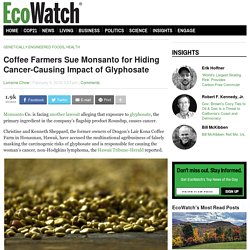
Growing Doubt: a Scientist’s Experience of GMOs. Independent Science News by Jonathan R.
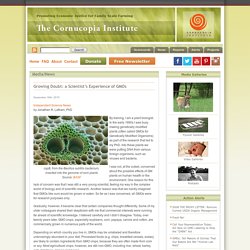
Latham, PhD By training, I am a plant biologist. In the early 1990s I was busy making genetically modified plants (often called GMOs for Genetically Modified Organisms) as part of the research that led to my PhD. Into these plants we were putting DNA from various foreign organisms, such as viruses and bacteria.
I was not, at the outset, concerned about the possible effects of GM plants on human health or the environment. Gradually, however, it became clear that certain companies thought differently. Depending on which country you live in, GMOs may be unlabeled and therefore unknowingly abundant in your diet. For meat eaters the nature of GMO consumption is different. Monsanto Class Action. Roundup’s Lesser-Known Cousin Is Coming to a Farm Near You. Jason Best, TakePartWaking Times It’s the next wave in a revolution of GMO crops—and it’s happening right under our noses.

One of the world’s leading groups of cancer experts has just classified the industrial herbicide 2,4-D as a possible human carcinogen, and that’s got one of the world’s biggest ag-tech companies in an uproar. But why should we care about some corporate kerfuffle? Because the U.S. is about to be deluged with 2,4-D—an herbicide similar to Roundup but lacking the comfort of a consumer-facing, trademarked name. Why The Netherlands Just Banned Monsanto’s Glyphosate-Based Herbicides. The Netherlands has just become the latest country, following Russia, Mexico, and many others, to say no to Monsanto.
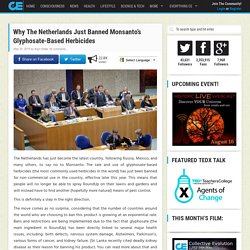
The sale and use of glyphosate-based herbicides (the most commonly used herbicides in the world) has just been banned for non-commercial use in the country, effective later this year. This means that people will no longer be able to spray RoundUp on their lawns and gardens and will instead have to find another (hopefully more natural) means of pest control. This is definitely a step in the right direction. The move comes as no surprise, considering that the number of countries around the world who are choosing to ban this product is growing at an exponential rate.
Bans and restrictions are being implemented due to the fact that glyphosate (the main ingredient in RoundUp) has been directly linked to several major health issues, including: birth defects, nervous system damage, Alzheimers, Parkinson’s, various forms of cancer, and kidney failure. Its More Than Monsanto. - Advertisement - I am an organic farmer in Ecuador.

My wife and I moved here almost five years ago from Chicago to retire. I knew almost nothing about agriculture and even less about nutrition. Sri Lanka Bans Monsanto Herbicide Citing Deadly Link To Kidney Disease. Sri Lanka has decided to completely ban glyphosate from their country, it’s the active ingredient in Monsanto’s Roundup herbicide.
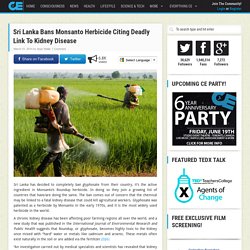
In doing so they join a growing list of countries that have/are doing the same. The ban comes out of concern that the chemical may be linked to a fatal kidney disease that could kill agricultural workers. Glyphosate was patented as a herbicide by Monsanto in the early 1970s, and it is the most widely used herbicide in the world.
A chronic kidney disease has been affecting poor farming regions all over the world, and a new study that was published in the International Journal of Environmental Research and Public Health suggests that Roundup, or glyphosate, becomes highly toxic to the kidney once mixed with “hard” water or metals like cadmium and arsenic. Former Pro-GMO Scientist Reveals Secrets of Years of Research. Is Roundup Weedkiller A Brain-Damaging Neurotoxin? Sayer Ji, GreenMedInfoWaking Times A new study reveals a hitherto unknown mechanism behind how the world’s most popular GMO herbicide harms the brain.

Remarkably, despite Roundup® herbicide’s widespread approval around the world, the most basic mechanisms through which it exerts toxicity towards non-target animal species (including humans) have yet to be adequately characterized. Concerned about Brazil’s status as the largest global consumer of pesticides since 2008, researchers sought to elucidate toxicologic effects of these agrochemicals in humans. How Monsanto is Destroying the Brains and Health of Everyone. Dr.
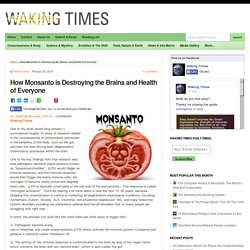
And The Award For Most Evil Company 2014 Goes To….Yes, You Guessed It. Monsanto really do work hard to get this kind of recognition...

Image Credit: modernfarmer.com Members of campaign group SumOfUs have voted Monsanto as the most evil company in the world 2014, which shouldn’t come as any surprise to regular readers of True Activist. It seems like Monsanto have been working hard to keep hold of this title for the past few years since first awarded it by readers of various magazines such as Organic Consumers and Natural News back in 2011. In 2014 alone, states the press release by SumOfUs, “Monsanto sued a tiny U.S. state for daring to label GMOs, and terrorized Guatemalan farmers because they were saving seeds to plant on their own.
Consumer Self-Defense: 12 Ways to Drive GMOs and Roundup off the Market. ‘Although Monsanto, industry scientists and corporate agribusiness claim that GMO crops and foods, and the chemicals that accompany them, are perfectly safe and therefore need no labeling or independent safety-testing, hundreds of independent scientists, that is, those not on the payroll of Monsanto or its minions, cite literally hundreds of studies showing that GMOs and their companion chemicals, such as Roundup, are extremely toxic. ‘ (Photo: Stephen Melkisethian/flickr/cc) “Monsanto should not have to vouchsafe the safety of biotech food,” said Phil Angell, Monsanto’s director of corporate communications.
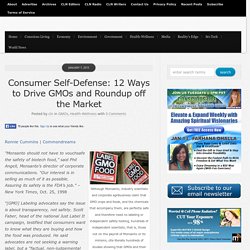
“Our interest is in selling as much of it as possible. By 2025 Half of all US Children Will Have Autism and Monsanto is to Blame. Dave Mihalovic, Prevent DiseaseWaking Times The overuse of Monsanto’s Roundup herbicide on our food is causing glyphosate toxicity and it is now being considered as the single most important factor in development of autism and other chronic disease.
At a recent panel discussion about GMOs, a senior scientist has stated that one in two children will be autistic by 2025. New Pesticide for GM Crops Approved for Market Despite Public Outcry. Heather Callaghan, ContributorWaking Times In late September, Dr. Oz made TV waves, openly warning against the EPA’s pending approval of a new, toxic pesticide intended for use on genetically engineered crops like corn and soy – this country’s biggest crops and food ingredients. (One wishes this type of consumer concern was heavily stirred during the EPA’s open comment period in the spring. But would it have prevented approval? Probably not, if history proves right.) Study: Glyphosate Doubles Risk Of Lymphoma. Scientists at the International Agency for Research on Cancer have found what appears to be a strong link between pesticide exposure and a blood cancer called non-Hodgkin lymphoma. Analyzing 44 individual research projects published since 1980, the scientists, writing in the International Journal of Environmental Research and Public Health, said that people exposed to the weed killer glyphosate, marked by Monsanto under the brand name Roundup, had double the risk of developing non-Hodgkin’s lymphoma.